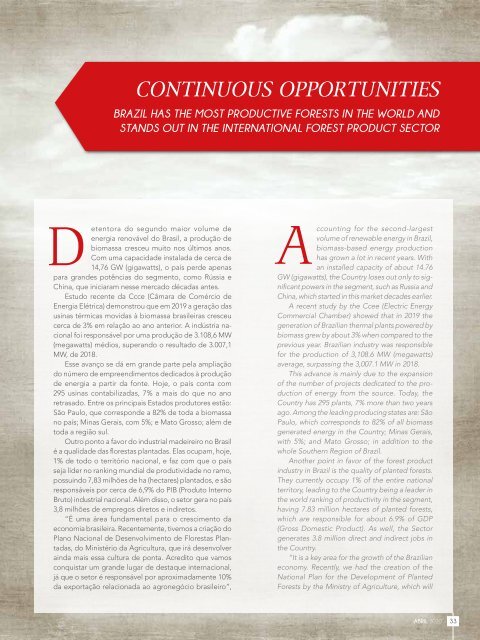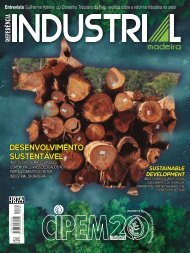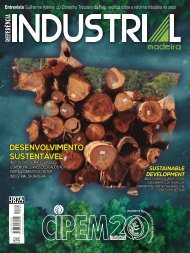Create successful ePaper yourself
Turn your PDF publications into a flip-book with our unique Google optimized e-Paper software.
CONTINUOUS OPPORTUNITIES<br />
BRAZIL HAS THE MOST PRODUCTIVE FORESTS IN THE WORLD AND<br />
STANDS OUT IN THE INTERNATIONAL FOREST PRODUCT SECTOR<br />
D<br />
etentora do segundo maior volume de<br />
energia renovável do Brasil, a produção de<br />
biomassa cresceu muito nos últimos anos.<br />
Com uma capacidade instalada de cerca de<br />
14,76 GW (gigawatts), o país perde apenas<br />
para grandes potências do segmento, como Rússia e<br />
China, que iniciaram nesse mercado décadas antes.<br />
Estudo recente da Ccce (Câmara de Comércio de<br />
Energia Elétrica) demonstrou que em 2019 a geração das<br />
usinas térmicas movidas à biomassa brasileiras cresceu<br />
cerca de 3% em relação ao ano anterior. A indústria nacional<br />
foi responsável por uma produção de 3.108,6 MW<br />
(megawatts) médios, superando o resultado de 3.007,1<br />
MW, de 2018.<br />
Esse avanço se dá em grande parte pela ampliação<br />
do número de empreendimentos dedicados à produção<br />
de energia a partir da fonte. Hoje, o país conta com<br />
295 usinas contabilizadas, 7% a mais do que no ano<br />
retrasado. Entre os principais Estados produtores estão:<br />
São Paulo, que corresponde a 82% de toda a biomassa<br />
no país; Minas Gerais, com 5%; e Mato Grosso; além de<br />
toda a região sul.<br />
Outro ponto a favor do industrial madeireiro no Brasil<br />
é a qualidade das florestas plantadas. Elas ocupam, hoje,<br />
1% de todo o território nacional, e faz com que o país<br />
seja líder no ranking mundial de produtividade no ramo,<br />
possuindo 7,83 milhões de ha (hectares) plantados, e são<br />
responsáveis por cerca de 6,9% do PIB (Produto Interno<br />
Bruto) industrial nacional. Além disso, o setor gera no país<br />
3,8 milhões de empregos diretos e indiretos.<br />
“É uma área fundamental para o crescimento da<br />
economia brasileira. Recentemente, tivemos a criação do<br />
Plano Nacional de Desenvolvimento de Florestas Plantadas,<br />
do Ministério da Agricultura, que irá desenvolver<br />
ainda mais essa cultura de ponta. Acredito que vamos<br />
conquistar um grande lugar de destaque internacional,<br />
já que o setor é responsável por aproximadamente 10%<br />
da exportação relacionada ao agronegócio brasileiro”,<br />
Accounting for the second-largest<br />
volume of renewable energy in Brazil,<br />
biomass-based energy production<br />
has grown a lot in recent years. With<br />
an installed capacity of about 14.76<br />
GW (gigawatts), the Country loses out only to significant<br />
powers in the segment, such as Russia and<br />
China, which started in this market decades earlier.<br />
A recent study by the Ccee (Electric Energy<br />
Commercial Chamber) showed that in 2019 the<br />
generation of Brazilian thermal plants powered by<br />
biomass grew by about 3% when compared to the<br />
previous year. Brazilian industry was responsible<br />
for the production of 3,108.6 MW (megawatts)<br />
average, surpassing the 3,007.1 MW in 2018.<br />
This advance is mainly due to the expansion<br />
of the number of projects dedicated to the production<br />
of energy from the source. Today, the<br />
Country has 295 plants, 7% more than two years<br />
ago. Among the leading producing states are: São<br />
Paulo, which corresponds to 82% of all biomass<br />
generated energy in the Country; Minas Gerais,<br />
with 5%; and Mato Grosso; in addition to the<br />
whole Southern Region of Brazil.<br />
Another point in favor of the forest product<br />
industry in Brazil is the quality of planted forests.<br />
They currently occupy 1% of the entire national<br />
territory, leading to the Country being a leader in<br />
the world ranking of productivity in the segment,<br />
having 7.83 million hectares of planted forests,<br />
which are responsible for about 6.9% of GDP<br />
(Gross Domestic Product). As well, the Sector<br />
generates 3.8 million direct and indirect jobs in<br />
the Country.<br />
“It is a key area for the growth of the Brazilian<br />
economy. Recently, we had the creation of the<br />
National Plan for the Development of Planted<br />
Forests by the Ministry of Agriculture, which will<br />
ABRIL <strong>2020</strong> 33

















